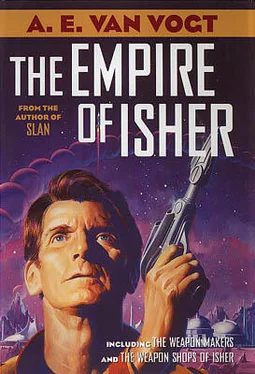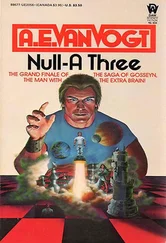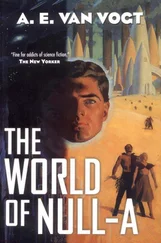“—AN INTERESTING EXAMPLE OF AN ENERGY IMPULSE CONTINUING AS IF NO OUTSIDE FORCE HAD BEEN APPLIED—”
“NO!”The answer was cold. “ THE MAN WAS AWARE OF US. THE PURPOSE DRIVING HIM WAS CARRIED THROUGH IN SPITE OF HIS KNOWLEDGE OF OUR EXISTENCE.”
“CLEARLY, THEN, HE ACTED ILLOGICALLY.”
“POSSIBLY. BUT LET US BRING HIM BACK… HERE…”
Hedrock recognized that the critical moment had come. For many hours he had been thinking of what he would do when it arrived, and for more than a minute, ever since he had sat down, he had been doing it.
His eyes were closed, his body calm, his mind slow and blank. It was not a perfect state of what the ancient Hindu fakirs had called Nirvana but it was a condition of profound relaxation; and millenia before, the great institutes for mind and sensory study had used it as the basis for all mind training. Sitting there, Hedrock grew conscious of a steady and enormous pulsing that shook his brain with its thunder. But that physical phase, that pounding of his heart with its attendant murmurs of blood flow, and all the tens of thousands of muscular tensions each with its own tiny sounds—that phase, also, passed. He was alone with utter calm and utter peace.
His first impression, then, was that he was sitting in a chair—but not the chair of his apartment. The picture grew so clear that he knew after a few seconds that the chair was in the control room of the lifeboat which in turn was inside one of the huge alien-controlled spaceships.
Hedrock sighed, and opened his eyes. He sat there letting the familiarity of the surroundings figuratively suffuse his being. So his resistance had failed. It was too bad, but of course he had not positively counted on success. He continued to sit in the multi-purposed control chair, because relaxation was his only method of resistance; and he intended to resist from now on.
While he waited, he glanced lazily into the glowing ’stats. Three of the view plates showed starry space, but there was an image of a ship in the rear view plate. Odd, he thought. His lifeboat must no longer be inside the alien machine. He considered that with a faint frown, and then he noticed something else. There was only one ship. But, then, where were the hundreds of others?
He fought down a rising excitement, as he realized what was happening. The relaxation process was working. Had worked to some extent. The spider beings had succeeded in bringing him back to his lifeboat, but their domination of his mind was partially broken; and so several of their illusions had faded from his mind.
The first illusion had been that there was more than one ship. Now, free of their control, he could see that there was only one. The second illusion had been that his lifeboat had been inside their machine. Now, free of their control, he could see that it wasn’t. He was about to go on in that orderly fashion when his mind leaped to the possibility that their control of him was probably very tenuous at this moment. He closed his eyes, and he was about to think himself back to his apartment when there was an interruption.
“Man, do not compel us to destroy you.”
He had been expecting a mental interference, instinctively cringing in anticipation of the titanic impact of it. The shock was different from his expectation. The alien thought lacked force. It seemed far away, weak. Hedrock was conscious of astonishment, an unsteady, wideeyed comprehension: This was the reality. Earlier, they must have established over him an instantaneous and complete rapport. Now, they had to reach at him from the outside. His situation was showing continuous improvement. The spider creatures that had seemed so supreme were being deflated every instant. Four hundred ships had become one. A seemingly super-human mind control was now reduced to reachable size. He had no doubt that their threat to destroy him was on a physical level. What they meant was that they would use energy beams against him.
It was a far cry from their irresistible domination of his entire nervous system, but it was as dangerous as ever. He must play his game cautiously, and await an opportunity. He waited, and presently a thought was directed at him:
“It is true that you have successfully released yourself from our mental thrall, and have discovered that there is but one ship. However, we have further use of you, and therefore we must ask you to cooperate under the threat of immediate extermination if you refuse.”
“Naturally,” said Hedrock, an old and successful cooperator, “I’ll do what is required unless it involves a near equivalent of extermination such as dismemberment.”
“We have in mind,” came the precise answer, “ a further sensory study of the Neelan twins. Since you were connected with the relationship when you were under our control, we can dispense with the twin on Earth, and work directly through you. There will be no pain, but you must yield yourself to the investigation.”
Hedrock protested, “I heard one of you say that Gil Neelan was dead. That was before I was put back on Earth. How can you work with a dead man?”
The reply was icy. “ Please allow us to handle the cell growth problems involved. Do you submit yourself?”
Hedrock hesitated, “Are you going to let me live—afterwards?”
“Naturally not”
He had expected that answer, but it was a shock nonetheless. Hedrock countered, “I don’t see how you can expect me to cooperate on such a basis.”
“We will, advise you of the moment of death. That will give you the emotional excitement you crave, and will thus conform to your requirements.”
Hedrock said nothing for a moment. He was fascinated. These monsters thought they would be catering to human nervous requirements by telling him when he was due to die. That was as far as they had gotten in their investigation of man’s emotional nature. It seemed incredible that anyone could miss the mark so completely. The intellectual approach of these creatures to life and death must be stoical in the extreme. Instead of trying to bite the hand that was reaching forth to destroy it, each individual spider probably examined all methods of escape and, finding none, accepted death without a struggle.
Hedrock said finally with a crisp ferocity, “You seem to have done pretty well, you and your kind. Here you are in a ship the size of a small moon. You obviously come from a mentally superior civilization; I’d like to see the planet that spawned you, its industries, its ordinary way of life. It should be interesting. Beyond doubt, your brand of logic has done well by you. Nature can pat herself on the back for a successful experiment in producing intelligence, but you’ve missed the point about man if you think that all I’m interested in is when I can expect to be killed.”
“What more would you like to know?” There was interest in the questioning thought.
Hedrock said wearily, “All right, you win. I’d like to know when I can get something to eat.”
“Food!” His questioner was excited. “ Did you hear that, — Xx-Y —(meaningless)?”
“Most interesting,” came another thought. “ At a critical moment the need for food is uppermost. It seems significant. Reassure him, and proceed with the experiment.”
Hedrock said, “You don’t have to reassure me. What do you want me to do?”
“Yield”
“How?”
“Submit. Think of the dead body.”
It was a relief to do that, and the picture grew remarkably sharp. He thought suddenly: Poor Gil, lying lifeless on a limitless sea of sand, his cells already collapsed from the ever rising pall of heat as the speedy planet drew ever nearer to one of its two parent suns. It was a strangely agonizing visualization for him, and yet, at the same time, thank God he was dead. The suffering was over. The mortal remains were beyond the pain of heat, beyond the ceaseless worry of the stinging sand, beyond thirst and hunger, beyond fear and unreasonable hope. Death had come to Gilbert Neelan as it must to all men. God bless him and keep him.
Читать дальше











